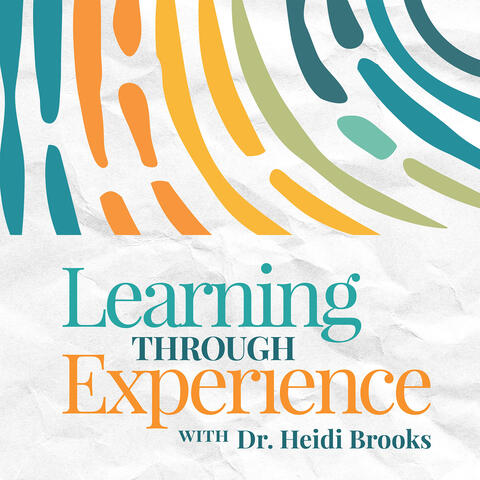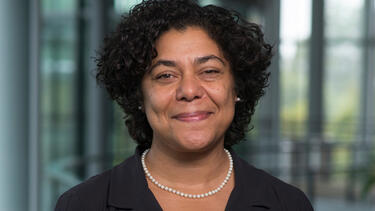Learning Through Experience
Leadership isn’t just what you know—it’s how you show up. Learning Through Experience is a Yale School of Management podcast hosted by Dr. Heidi Brooks. Each episode explores how leaders learn through the moments that matter: meetings, relationships, decisions, and dilemmas. Drawing on guests’ wisdom and questions from listeners, the show turns insight into practice and transforms life into a learning laboratory.

Subscribe on YouTube and in Apple Podcasts, Spotify, or your favorite podcast player. For deeper insights and reflections about each episode, subscribe to the LinkedIn newsletter. We love to hear from listeners and viewers about what resonated, topics and guests you hope we take on, and of course, about your experience! Reach out to us at LTEpodcast@yale.edu.
Episodes
- Podcast
The Beautiful Problem with Gianpiero Petriglieri
In this episode, Heidi Brooks and Gianpiero Petriglieri invite you to step out of the mechanical pursuit of efficiency and into the “beautiful problem” of being human in a professional world. Through their conversation, Heidi and GP take you on a journey to reframe your everyday experiences as moments of learning, curiosity, and choice. They guide you through the essential tension between convergence, the practice of meeting a standard, and divergence, the freedom to ask “what else?” as you build a more spacious relationship with your experiences. They deconstruct and put back together the tensions between our goals of work and life. Ultimately, Heidi challenges you to reclaim your agency through what GP calls “The Work”: the intentional use of your attention and relationships with others to resist seductive shortcuts (including AI) that undermine the learning lab that is your life.

- Podcast
Co-Creating the Conditions for Learning
In this season finale, we do something a little different. Instead of featuring an outside guest, we bring you behind the scenes—with the voices and minds who help design and deliver the very work this podcast explores. Dr. Heidi Brooks is joined by her colleagues David Tate and Stacey Casamassima for a candid, deeply human conversation that essentially doubles as a real team meeting. This is the team that teaches and leads “Everyday Leadership” at Yale and facilitates high-touch programs like Interpersonal and Group Dynamics, Holding Space, and more. And this time, they’re turning the mic inward.

- Podcast
Invisible No More: Art as a Tool for Agency
What does it mean to create something that didn’t exist before—and to do so with a sense of possibility, even in the face of constraint? In this episode, artist Mario Moore joins Dr. Heidi Brooks to reflect on art as agency, the power of process, and the untold stories behind his Yale-commissioned painting Black Governors. Together, they explore the tension between presence and invisibility, and what it means to embed stories within stories—without always offering a central gaze or a single interpretation.

- Podcast
Facing Uncertainty as a Practice: Freedom, Presence and the Patterns We Inherit
In a time marked by anxiety, division and disconnection, the path forward lies not in fixing the past but in expanding our freedom to imagine what’s next. In this episode of Learning Through Experience, Dr. Heidi Brooks is joined by Suzi Tucker, a writer, teacher and pioneer of Family Constellations work. Together, they explore how our personal and ancestral stories shape the patterns we repeat—and how stepping into those patterns with curiosity can help us reorient toward hope.

- Podcast
America Unfiltered: Can Empathy Bridge Our Greatest Divides?
How can storytelling deepen our understanding of emotional connection in turbulent times? Join Heidi Brooks for a powerful and special episode of Learning Through Experience featuring returning guest Marc Brackett, along with filmmakers Horacio Marquínez and Kirill Myltsev. Together, they explore the extraordinary journey behind their documentary, America Unfiltered: Portraits and Voices of a Nation, a film born out of curiosity, human connection and the transformative power of experience.

- Podcast
Joy is an Inside Job: Art, Gratitude and Cultivating Resilience
What does it take to cultivate joy—not as a fleeting feeling, but as a steady presence—even in times of deep uncertainty? In this luminous conversation, Dr. Heidi Brooks is joined by psychologist and author Emma Seppälä and artist Clara Nartey to explore the resilient, regenerative power of joy. With insights drawn from neuroscience, personal experience and artistic practice, Emma and Clara reflect on how inner sovereignty—the ability to return to center amid chaos—can help us meet the world with greater creativity, calm, and connection.

- Podcast
What Might Be: Navigating Paradox in Creating Microspaces of Justice
What if the institutions we rely on—our workplaces, schools, and legal systems—aren’t built for full participation? And what if real change starts not from the top, but in small, intentional spaces we create ourselves? In this episode Heidi Brooks and legal scholar and change-maker Susan Sturm explore the paradoxes of institutional transformation, and how facing uncertainty–rather than seeking to eliminate it–can create new possibilities for participation, collaboration and justice.

- Podcast
The Growth Curriculum: How Everyday Struggles Shape Us
What if the challenges you’re facing aren’t obstacles—but invitations to grow? In this episode, Heidi Brooks and leadership expert Jennifer Garvey Berger explore how we grow through uncertainty, not just survive it. They also discuss why change is essential for leaders, how to turn everyday challenges into opportunities for growth and why embracing imperfection might be the key to thriving in an anxious world.

- Podcast
Art as Experience: How Aesthetic Experience Fuels Creativity, Collaboration, and Wellbeing
Creative expression is essential for everyone—to think differently, connect deeply and thrive through uncertainty. In the Season 4 premiere of Learning Through Experience, Heidi Brooks welcomes Ivy Ross and Susan Magsamen, co-authors of Your Brain on Art, for a thought-provoking conversation about how engaging with art can help shape the way we learn, collaborate and navigate life’s complexities.

- Podcast
Introducing Season 4 of Learning Through Experience
Welcome to a new season of Learning Through Experience! This season will explore something that resonates deeply with everyone right now: facing uncertainty. My conversations are with a diverse array of exceptional guests who will talk with us about how they see and experience uncertainty through their lens. Together, we’ll dig into the mindsets, practices and environments that allow us to learn, adapt and thrive, even in—perhaps especially in—these uncertain times. Welcome to Season 4. I love having you here!

